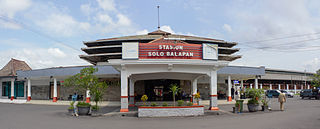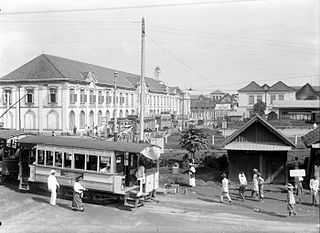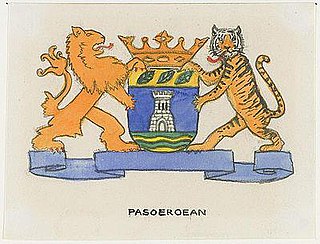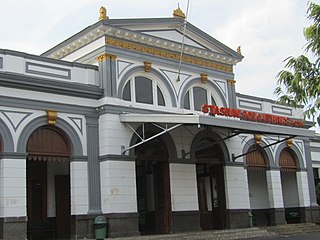
0-6-0 is the Whyte notation designation for steam locomotives with a wheel arrangement of no leading wheels, six powered and coupled driving wheels on three axles, and no trailing wheels. Historically, this was the most common wheel arrangement used on both tender and tank locomotives in versions with both inside and outside cylinders.

Jakarta Kota Station is a railway station, located in the old city core of Kota, Jakarta, Indonesia.

Surabaya Pasar Turi Station or Surabaya Pasarturi Station (SBI) is the second largest railway station in Surabaya, East Java. It is located near the Pasar Turi market in Bubutan, Surabaya. It is the main departure point of all train from Surabaya which passes through Pantura to the western cities of Java such as Jakarta and Semarang, but trains south and east line from Surabaya departed from Surabaya Gubeng. Since 2014, the station has upgraded railway signal and railroad switch devices from mechanical to electrical type produced by Len Industri.

Solo Balapan Station is a major railway station in Surakarta, Central Java, Indonesia. The name "Balapan" is taken from the name of a village which is located to the north of the station. The station is located on the railway line that connects the cities of Bandung, Jakarta, Surabaya, and Semarang. Solo Balapan Station is the largest station in Surakarta and Central Java.
Numerous industrial narrow-gauge lines were built for peat extraction, clay extraction for brickworks and construction sites. The dominant gauge for industrial lines was 700 mm, contrary to the 600 mm gauge used in neighbouring countries.

Depok Station (DP) is a railway station located in Pancoran Mas, Pancoran Mas, Depok, West Java. This station is commonly known as Depok Lama, to distinguish with Depok Baru Station. The station is one of the oldest station in Jakarta metropolitan area. At present it serves as a station of Jakarta Commuter Rail. Depok EMU depot is located to the southwest of the station.

Karawang Station (KW) is a railway station located in Nagasari, West Karawang, Karawang Regency. The station, which is located at an altitude of +16 m, is included in the Operation Area I Jakarta and is the station that is located in the westernmost of Karawang Regency.
Most railway lines in Indonesia were constructed during the Dutch colonial rule. After independence in 1945, many lines were abandoned. The current national rail operator, PT Kereta Api Indonesia (Persero), was founded on 28 September 1945.

N.V. Nederlandsch-Indische Spoorweg Maatschappij, abbreviated to NIS, NISM or N.V. NISM was a private-owned railways company in charge of rail transport in Java, Dutch East Indies. The company's headquarters were in Semarang, Central Java. The company started its maiden route from Semarang to the Vorstenlanden and in 1873 they also built their line to the Willem I Railway Station of Ambarawa–Kedungjati and Batavia–Buitenzorg lines. Later the network expanded to Bandung and Surabaya. It was absorbed into the present Kereta Api Indonesia after Indonesian independence in 1949. It was the main competitor to Staatsspoorwegen as state-owned railway company and established on April 6, 1875.

The Jakarta tram system was a transport system in Jakarta, Indonesia. Its first-generation tram network first operated as a horse tram system, and was eventually converted to electric trams in the early twentieth century.

The Madoera Stoomtram Maatschappij on Madura Island today's Indonesian province of Jawa Timur was one of the railway companies in the Dutch East Indies. The company had its headquarters in The Hague and was licensed in 1896. In 1901 it put the first steam trams in operation to connect the western with the eastern end of the island.

The Pasoeroean Stoomtram Maatschappij, N.V. was a private tramway in Pasuruan on the Dutch East Indies. It served passenger transport as well as goods transport of agricultural products such as sugarcane, tea and tobacco.

The Samarang–Joana Stoomtram Maatschappij, N.V. was from 1879 to 1959 a private tram company on the Dutch East Indies, providing passenger and freight trains on a 417 kilometres (259 mi) long network with a gauge of 1,067 mm.

Staatsspoorwegen was a state-owned railway company managed by the Dutch East Indies colonial government. It was absorbed into the present Kereta Api Indonesia after Indonesian independence in 1945. The main competitor was Nederlandsch-Indische Spoorweg Maatschappij (NIS) as private-owned railways company which had standard gauge and cape gauge lines.

Cikampek Station (CKP) is a large class type B railway station located in Cikampek Kota, Cikampek, Karawang Regency. The station, which is located at an altitude of +46 meters, is the station that is located in the easternmost part of the Operational Area I Jakarta and Karawang Regency, and is the largest railway station in Karawang Regency.

Solo Jebres Station, also known as Jebres Station, is a type-C large class railway station in Surakarta, Central Java, Indonesia. The station, which is located 97 metres (318 ft) above sea level, is operated by Operational Area VI Yogyakarta of Kereta Api Indonesia (KAI). It is one of the major railway stations in the city.

There was a tram system in Surabaya, East Java, Indonesia from 1889 to 1978. The tramway was operated by a private company Oost-Java Stoomtram Maatschappij, and later by Kereta Api Indonesia (KAI), and was the only OJS-owned rail system survived in post-independence Indonesia. The tramway linked Ujung with Wonokromo and continued towards Krian in Sidoarjo. All land assets of the tramway is currently owned by Operational Area VII Surabaya of the KAI.

Pasuruan Station (PS) is a II class railway station located in Trajeng, Panggungrejo, Pasuruan; this station is in PT.KAI Operation Area IX of Jember at the height of 3 meters above sea level.

Bangil Station (BG) is a class I (one) railway station located in Pogar, Bangil, Pasuruan Regency; entered within eastern border of Operational Area VII Surabaya of Kereta Api Indonesia (KAI) at the height of ± 9 meters above sea level. To the east of this station, there are branches towards Pasuruan-Probolinggo-Jember-Banyuwangi and to Malang.

Oost-Java Stoomtram Maatschappij (OJS) is the name of a private railway company which once operated in Surabaya, Dutch East Indies. The network had 46 stops with a total of near 66 miles (107 km) track; prior to its demise, it operated between the cities of Surabaya and Sidoarjo, Mojokerto Regency and Jombang Regency, on a mixture of former railway lines and urban on-street running.




















